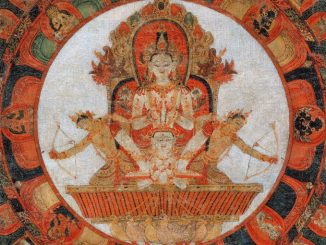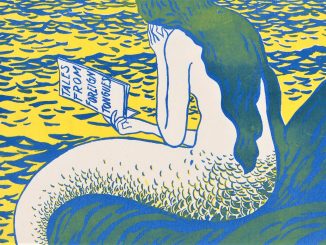
In the words of our Managing Editor, Aïcha Martine Thiam: “Motherhood has often been considered a pinnacle of wisdom and serenity, a sort of joining together of all those parts of ourselves that were supposedly, until this point, in lesser focus. But in truth, more often than not, motherhood opens more doors than it closes. It is an endless series of complications and ambiguities that are put into sharper relief by the arrival of a daughter.
“Some mothers are bestowed with this charge before they are ready; broken girls who have barely stayed the hand on their volatility. Others must go to bat for that coveted title, shouldering setback after heartbreaking setback just to bring a little one to life. And then of course, there are all those in between, willing or unwilling to take on the challenge, aware or unaware that this is what they want, convinced that they have all the answers their own daughterhood did not provide: and always, they are proved wrong.
“In that transition from daughterhood to motherhood, women often become locked in this intrinsic cycle of seeing themselves in their mothers, and seeing themselves in their daughters; to the point where they are merely Venn Diagrams where they believe only the most complicated aspects of both parts meet. Mothers often spend a lifetime rejecting and loving themselves through their daughters, rejecting and loving the ways in which they are different from, or similar to them. This is simultaneously thrilling and terrible, and it spills out into the way they love their daughters, or are incapable of doing so.
“What emerges from the following four stories is this precise push and pull, that aforementioned ambiguity, pondered through the lens of devotion and loss, of privilege and resentment, of injustice and forgiveness. More so than the way they were raised or the choices they make, the way these women approach that ambiguity often sets the tone for the kind of mothers they are, were, or could be. These stories do not seek the closure at the end of that long string of questioning: rather, they acknowledge that sailing the tricky waters of life with a daughter is a series of half-certainties that aren’t meant to be answered, but merely re-asked, and re-examined over and over again, until it makes or breaks you.”
Act 1: “Miscarriages of Social Justice,” by Kelly A. Dorgan and read by Candy Bryant. Published in The Nasiona, 20 December 2018.
In “Miscarriages of Social Justice,” Kelly A. Dorgan filters her personal tragedy through the standpoint of privilege. She notes how she underwent a series of miscarriages in an atmosphere of care and support that women of other socioeconomic backgrounds are seldom accorded. By doing so, she reflects on the singularity of discrimination and trauma that often cuts across the lines of universality women might share.
Act 2: “About Chains,” written and read by Holly Pelesky. Published in The Nasiona, 10 January 2019.
In this next story, a letter to the daughter she put up for adoption, Holly Pelesky studies motherhood through the angles of her splintered bond with her own mother, as if to say: this is why I am the way I am, and this is why I did what I did when it came to you. It is a haunting observation of our perceived similarities with the women who gave birth to us and the women we give birth to, and of the way daughters often cement their mothers’ fates, either by trapping, or freeing them.
Act 3: “Diptych: Origins, Neurodivergence,” by Deborah Elderhorst and read by Jo Weston. Published in The Nasiona, 13 February 2019.
This next story is a love letter from Deborah Elderhorst to her daughter. The bond she describes is a beautiful, profound one, and brings to light that age-old notion of a mother’s unconditional love. Conversely, it also challenges a commonly-held concept: it is generally accepted that mothers can be their daughters’ most powerful teachers, for good or ill. But when it is least expected, daughters can also split open their mothers’ understanding of the world, revealing universes of wonders they did not know could exist.
Act 4: “Wedding Portrait,” by Jennifer Bostwick Owens and read by Monique Shutt. Published in The Nasiona, 22 January 2019.
In “Wedding Portrait,” a parallel story is told: that of a moment of sweet bonding between author Jennifer Bostwick Owens and her biracial daughter over the viewing of Prince Harry and Meghan Markle’s wedding, and that of Owens’ reminiscence on the challenges she faced, decades earlier, when she fell for a black man at the strong disapproval of her white family. The cultural significance of the royal wedding is an occasion for her to reflect on the power that love has to bring about acceptance, and vice-versa, the only legacy she wishes to pass onto her children.
The Nasiona Podcast shares stories that explore the spectrum of human experience and glimpse into foreign worlds. We focus on stories based on facts, truth-seeking, human concerns, real events, and real people, with a personal touch. From liminal lives to the marginalized, and everything in between, we believe that the subjective can offer its own reality and reveal truths some facts can’t discover. Hosted, edited, and produced by Julián Esteban Torres López.
Our theme song is “Into the West,” courtesy of Tan Vampires.
You can also find our podcast episodes on Apple Podcasts, Google Play Music, and Stitcher.
Hosts

Julián Esteban Torres López is a Colombian-born journalist, researcher, writer, and editor. Before founding The Nasiona, he ran several cultural and arts organizations, edited journals and books, was a social justice and public history researcher, wrote a column for Colombia Reports, taught university courses, and managed a history museum. He’s a Pushcart Prize nominee and 1st place winner of the Rudy Dusek Essay Prize in Philosophy of Art. He has authored several books, including Marx’s Humanism and Its Limits, which was BookAuthority’s Best New Socialism Book of 2018, and Reporting on Colombia: Essays on Colombia’s History, Culture, Peoples, and Armed Conflict (forthcoming, 2019).
Go here to inquire about his editing services.
Twitter: je_torres_lopez
 Aïcha Martine Thiam is a trilingual writer, musician, artist, and an Assistant Editor at Reckoning Press. She will quote obscure film facts at you, unprovoked. Some of her fiction and nonfiction can be found on The Rumpus, Medium, Lamplight, Metaphorosis, and Bright Wall/Dark Room, among others.
Aïcha Martine Thiam is a trilingual writer, musician, artist, and an Assistant Editor at Reckoning Press. She will quote obscure film facts at you, unprovoked. Some of her fiction and nonfiction can be found on The Rumpus, Medium, Lamplight, Metaphorosis, and Bright Wall/Dark Room, among others.
Twitter: @Maelllstrom
Essay Contributors
 KELLY A. DORGAN’s nonfiction work has appeared in books like Performing Motherhood, research journals like Women and Health, and online publications like NYMBM (2018). Raised in Southern Appalachia, she has rooted herself in the mountains where she is an educator, researcher, and writer specializing in the study of illness, gender, and culture.
KELLY A. DORGAN’s nonfiction work has appeared in books like Performing Motherhood, research journals like Women and Health, and online publications like NYMBM (2018). Raised in Southern Appalachia, she has rooted herself in the mountains where she is an educator, researcher, and writer specializing in the study of illness, gender, and culture.
Twitter: @KADorgan
 HOLLY PELESKY is a lover of spreadsheets, giant sandwiches, and handwritten letters. She holds an MFA from the University of Nebraska. She cobbles together gigs to get by, refusing to give up this writing life. She lives in Nebraska with her two sons.
HOLLY PELESKY is a lover of spreadsheets, giant sandwiches, and handwritten letters. She holds an MFA from the University of Nebraska. She cobbles together gigs to get by, refusing to give up this writing life. She lives in Nebraska with her two sons.
Twitter: @hollypelesky
 DEBORAH ELDERHORST is an Australian-Canadian writer of creative nonfiction and literary fiction. Her work has appeared in Clover Press/Visible Ink’s 2018 anthology, “Trace,” The Tishman Review, and Phantom Billstickers Café Reader.
DEBORAH ELDERHORST is an Australian-Canadian writer of creative nonfiction and literary fiction. Her work has appeared in Clover Press/Visible Ink’s 2018 anthology, “Trace,” The Tishman Review, and Phantom Billstickers Café Reader.
Twitter: @ElderhorstDeb
 JENNIFER BOSTWICK OWENS holds degrees in English from Stanford University and Mills College and has had pieces published by StyleBlueprint, Mothering and SheKnows. In Nashville, she serves as a writing coach for graduate students at Vanderbilt and is an active member of the Porch Writers’ Collective.
JENNIFER BOSTWICK OWENS holds degrees in English from Stanford University and Mills College and has had pieces published by StyleBlueprint, Mothering and SheKnows. In Nashville, she serves as a writing coach for graduate students at Vanderbilt and is an active member of the Porch Writers’ Collective.
Voice Actors
 CANDY BRYANT is a veteran radio personality who lived up and down the dial and across the country. Before accepting a position, teaching and managing the student radio station, at East Tennessee State, Candy worked in television news, wrote and produced documentaries, and performed voice talent for many commercial and educational programs.
CANDY BRYANT is a veteran radio personality who lived up and down the dial and across the country. Before accepting a position, teaching and managing the student radio station, at East Tennessee State, Candy worked in television news, wrote and produced documentaries, and performed voice talent for many commercial and educational programs.
 HOLLY PELESKY is a lover of spreadsheets, giant sandwiches, and handwritten letters. She holds an MFA from the University of Nebraska. She cobbles together gigs to get by, refusing to give up this writing life. She lives in Nebraska with her two sons.
HOLLY PELESKY is a lover of spreadsheets, giant sandwiches, and handwritten letters. She holds an MFA from the University of Nebraska. She cobbles together gigs to get by, refusing to give up this writing life. She lives in Nebraska with her two sons.
Twitter: @hollypelesky
 JO WESTON is a writer and poet based in Nottingham, England. She has an MA in Creative Writing with distinction and has been a Writer-in-Residence for the Maggie’s Centre. Shortlisted for the Bridport Prize and longlisted in Mslexia’s Poetry Competition, her work has been published in anthologies and magazines, and broadcast on BBC radio.
JO WESTON is a writer and poet based in Nottingham, England. She has an MA in Creative Writing with distinction and has been a Writer-in-Residence for the Maggie’s Centre. Shortlisted for the Bridport Prize and longlisted in Mslexia’s Poetry Competition, her work has been published in anthologies and magazines, and broadcast on BBC radio.
 MONIQUE SHUTT is an alumna of the University of New Hampshire. When she’s not teaching English in a small New England town, she is nurturing her children with outdoor adventures and the arts.
MONIQUE SHUTT is an alumna of the University of New Hampshire. When she’s not teaching English in a small New England town, she is nurturing her children with outdoor adventures and the arts.


